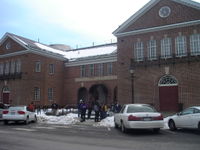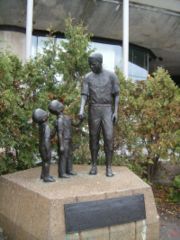Jackie Robinson
2007 Schools Wikipedia Selection. Related subjects: Sports and games people
| Personal Info | |
|---|---|
| Birth | January 31, 1919, Cairo, Georgia |
| Death: | October 24, 1972, Stamford, Connecticut |
| Professional Career | |
| Debut | April 15, 1947, Brooklyn Dodgers vs. , |
| Team(s) | As Player Brooklyn Dodgers ( 1947 - 1956) |
| HOF induction: | 1962 |
| Career Highlights | |
|
|
|
|
|
 |
|
| Jackie Robinson | |
| "n/a" | |
| Inducted as a member of the Brooklyn Dodgers (42) | |
| Year Inducted: 1962 | |
| First Year Elligible: 1962 | |
Jack Roosevelt "Jackie" Robinson ( January 31, 1919 - October 24, 1972) became the first African American Major League Baseball player of the modern era in 1947. The Baseball Hall of Fame inducted Robinson in 1962 and he was a member of six World Series teams. Jackie earned six consecutive All-Star Game nominations and won several awards during his career. In 1947, Robinson won The Sporting News Rookie of the Year Award and the National League Rookie of the Year Award. Two years later, Jackie won the 1949 National League MVP Award.
In recognition of his accomplishments both on the field and off of it, every Major League Baseball team retired the number 42. This was the number Jackie wore during his career. He was the subject of a 1950 film biography, The Jackie Robinson Story, in which he played himself, and became a political activist in his post-playing days.
Early life
In 1919, Jackie Robinson, the youngest of five children, was born near Cairo, Georgia during a Spanish Flu epidemic. In 1920 his family moved to Pasadena, California after his father abandoned them.
Growing up, he lived in relative poverty and even joined a local neighbourhood gang. Eventually, friend Carl Anderson persuaded Robinson to abandon the gang.
In 1935 Jackie Robinson graduated from Washington Junior High School and enrolled in John Muir High School ("Muir Tech"). There he played on various Muir Tech sport teams. He was a shortstop and catcher on the baseball team, a quarterback on the football team, a guard on the basketball team, and a member of the tennis team and the track and field squad. He won awards in the broad jump.
In 1936 he captured the junior boys singles championship in the annual Pacific Coast Negro Tennis Tournament, starred as quarterback and earned a place on the annual Pomona baseball tournament all-star team, one which included future Major League Baseball Hall of Famers Ted Williams and Bob Lemon. The next year, Jackie played for the high school's basketball team. That year, the Pasadena Star-News newspaper ran a piece on Jackie.
After leaving Muir, Jackie attended Pasadena Junior College and played both football and baseball. He played quarterback and safety for the football team, shortstop and leadoff batter for the baseball team and participated in the broad jump.
While at PJC, he was elected to the "Lancers", a student run police organization responsible for patrolling various school activities. He dated and made friends. However, on January 25, 1938, he was arrested, the reason speculative, and sentenced to two years probation.
In 1938 he was elected to the All-Southland Junior College (baseball) Team and selected as the region's Most Valuable Player.
On February 4, 1939, he played his last basketball game at Pasadena Junior College. Jackie then received a gold pin and was named to the school's "Order of the Mast and Dagger".
UCLA
On February 15, 1939, Jackie enrolled at the University of California, Los Angeles. While at UCLA, Jackie played basketball, ran track, played varsity baseball, and started for the Bruins football team.
He excelled at each of these four sports and consequently became the first athlete in UCLA history to letter in four different sports in one year. He was also a 24- letterman. Until 1947 he was presumed to be the only person ever selected to play in the college all-star games in both basketball and football. He left college in 1941 because of financial problems, not many credits from a bachelor's degree.. Before he left, he met the woman he would eventually marry, Rachel Robinson. He and Rachel married in 1946 and had three children, Jackie Jr., Sharon and David.
Robinson in the Army
After leaving UCLA his senior year, Robinson enlisted in the U.S. Army during World War II. He was assigned to the U.S. 761st Tank Battalion, an all black battalion. While initially refused admission to Officer Candidate School, he fought for it and eventually was accepted and, upon graduation, was commissioned as a second lieutenant and branched Armor. While training in the Army at Fort Hood, Texas, Robinson refused to go to the back of a public bus. He was court-martialed for insubordination and, therefore, never made it to Europe with his unit. He later received an honorable discharge in 1944, after being acquitted of all charges at the court-martial.
Jackie played baseball in 1944 for the Kansas City Monarchs in the Negro American League, where he was noticed by Clyde Sukeforth, a scout working for Branch Rickey, although David Halberstam, in October 1964, asserts that legendary super-scout Tom Greenwade discovered and secretly followed Robinson for a month on the road.
The Dodgers
In the late 1940's, Branch Rickey was club president and general manager of the Brooklyn Dodgers. The Dodgers began to scout Robinson and Rickey eventually selected Jackie from a list of promising African-American players. Robinson became the first player in fifty-seven years to break the Baseball colour line.
In 1946, the Dodgers assigned to Jackie to Montreal Royals. Because of Jackie's play in 1946, the Dodgers called him up to play for the major league club in 1947. Robinson debuted on April 15, 1947. Jackie went 0-3 and played first base.
Although Jackie played every game that season at first base, Robinson spent most of his career as a second baseman. Later in his career, he played games at third base and in the outfield.
Throughout the season, Robinson experienced harassment at the hands of both players and fans. He was verbally assaulted by both his own teammates and by members of opposing teams. Several Dodger players insinuated they would strike if forced to play alongside Robinson. The mutiny ended when Dodger management informed those players that they were welcome to find employment elsewhere.
On April 22, 1947, players on the Philadelphia Phillies called Jackie a "nigger" from their dugout. They yelled that he should "go back to the cotton fields." Rickey would later recall that the Phillies' Ben Chapman "did more than anybody to unite the Dodgers. When he poured out that string of unconscionable abuse, he solidified and united thirty men." Baseball Commissioner Happy Chandler admonished the Phillies and asked Chapman to pose for photographs with Robinson as a conciliatory gesture and the two players obliged.
For his services, Jackie earned the major-league minimum salary of $5000--which was standard for many rookies at the time. That year, he played in 151 games, hit .297, lead the National League in stolen bases and won the Rookie of the Year award.
Two years later, Jackie won the Most Valuable Player award for the National League. Jackie won his only championship ring when the Dodgers beat the New York Yankees in the 1955 World Series.
After the 1956 season, Robinson was sold by the Dodgers to the New York Giants. Rather than report to the Giants, Robinson chose to retire at age 37.
Robinson was a disciplined hitter and a versatile fielder. He had a .311 career batting average and substantially more walks than strikeouts. He played several defensive positions and was a noted base stealer; no other player since World War II has stolen home more than Robinson. During his career, the Dodgers played in six World Series and Jackie played in six All-Star games. He is a member of the Baseball Hall of Fame and a member of the All-Century Team. In one of his most famous quotes, he said "I'm not concerned with your liking or disliking me... all I ask is that you respect me as a human being."
Post-baseball life
Robinson retired on January 5, 1957. He had wanted to manage or coach in the major leagues, but received no offers. He became a vice-president for the Chock Full O' Nuts corporation instead, and served on the board of the NAACP until 1967, when he resigned. During the early to late 50's, Jackie and Louis Ostrer owned Jackie Robinson's, a men's clothing store located on 125th St. in New York City.
He was inducted into the Baseball Hall of Fame in 1962, his first year of eligibility, becoming the first African-American so honored. On June 4, 1972 the Dodgers retired his uniform number 42 alongside Roy Campanella (39) and Sandy Koufax (32).
Robinson made his final public appearance on October 14, 1972, before Game 2 of the World Series. He used this chance to express his wish for a black manager to be hired by a Major League Baseball team.
This wish was granted two years later, following the 1974 season, when the Cleveland Indians gave their managerial post to Frank Robinson, a Hall of Fame bound slugger who was then still an active player, and no relation to Jackie Robinson. At the press conference announcing his hiring, Frank expressed his wish that Jackie had lived to see the moment.
Robinson's final few years were marked by tragedy. In 1971, his eldest son, Jackie, Jr., who had beaten back drug problems and was working as a Daytop Village counselor, was killed in an automobile accident. Also, Jackie suffered from diabetes, virtually went blind, and suffered heart problems.
Jackie Robinson was pronounced dead in Stamford, Connecticut on October 24, 1972 and was interred in the Cypress Hills Cemetery in Brooklyn, New York. The highway that goes through the cemetery ( Interborough Parkway) has been renamed the Jackie Robinson Parkway.
Trivia & interesting facts
- In 1997 (the 50th anniversary of his major league debut), his number 42 was retired by all major league teams, though players who wore the number at the time were allowed to retain it until the end of their careers. In 2004, Major League Baseball designated that April 15 each year would be marked as "Jackie Robinson Day" in all their ballparks.
- In 2000, he ranked number 44 on The Sporting News' list of the 100 Greatest Baseball Players, and was elected to the Major League Baseball All-Century Team.
- The book Carl Erskine's Tales from the Dodgers Dugout: Extra Innings (2004) includes short stories from former Dodger pitcher Carl Erskine. Robinson is prominent in many of these stories.
- On October 29, 2003, the United States Congress posthumously awarded Robinson the Congressional Gold Medal, the highest award the Congress can bestow. Robinson's widow accepted the award in a ceremony in the Capitol Rotunda on March 2, 2005.
- At the November, 2006 groundbreaking for a new New York Mets ballpark, Citi Field, scheduled to open in 2009, it was announced that the main entrance, modeled on the one in Brooklyn's old Ebbets Field, will be called the Jackie Robinson Rotunda. Additionally, Mets owner Fred Wilpon said that the Mets and Citigroup would work with the the Jackie Robinson Foundation to create a Jackie Robinson Museum and Learning Centre in lower Manhattan, as well as fund scholarships for "young people who live by and embody Jackie's ideals."



